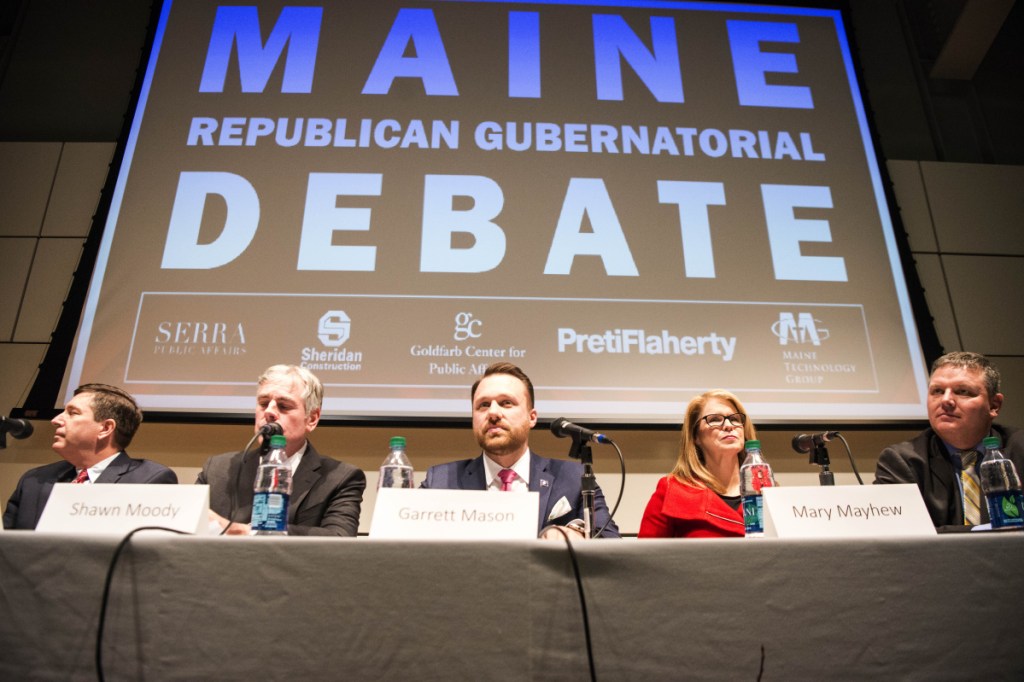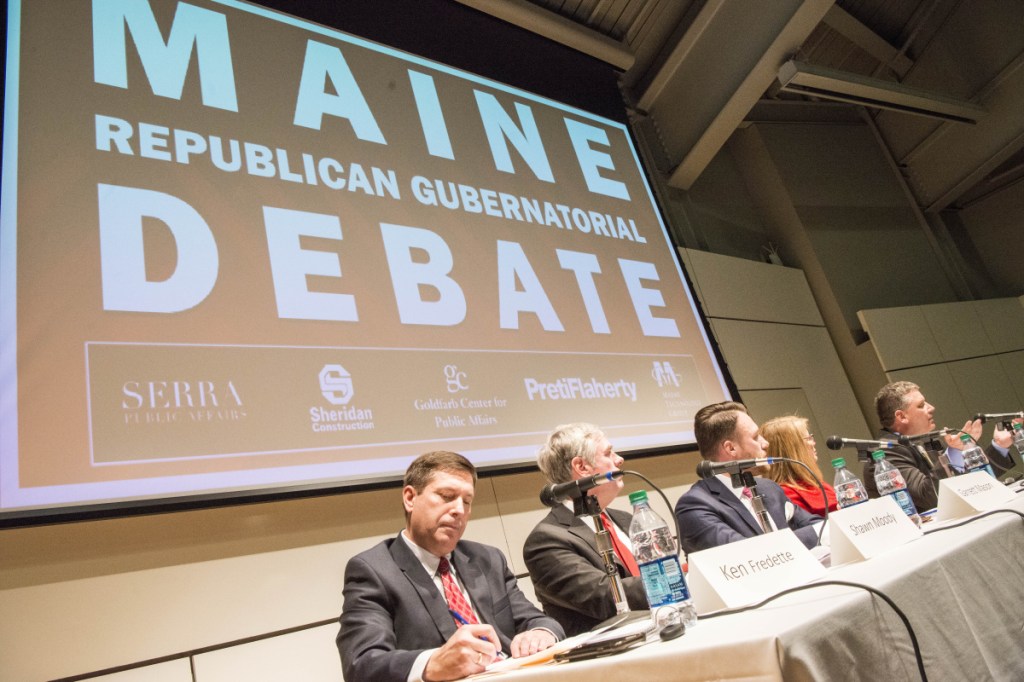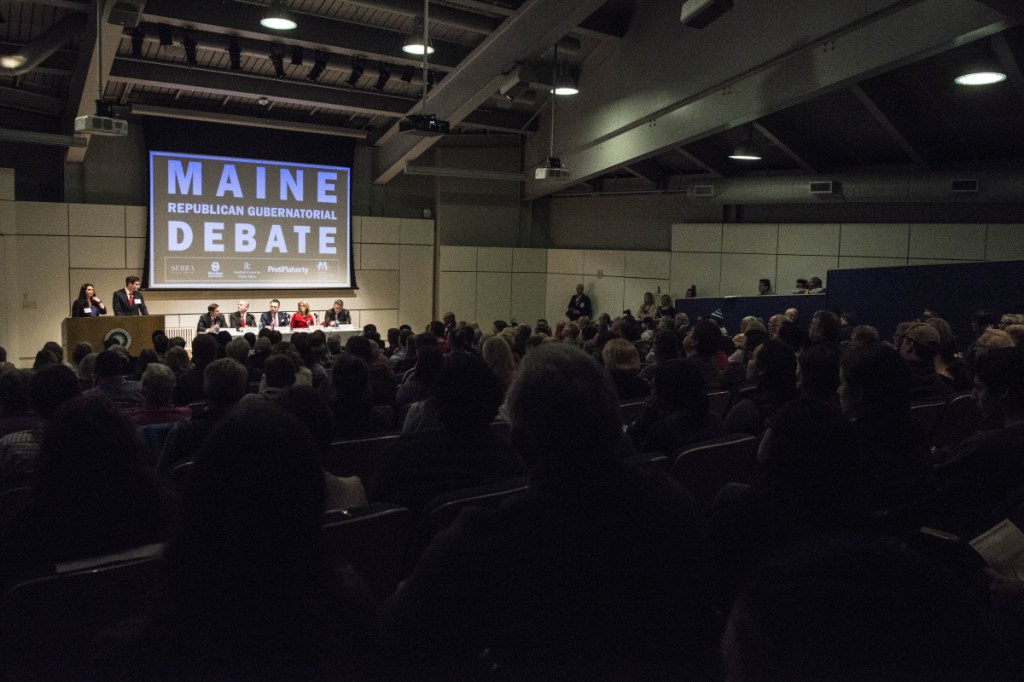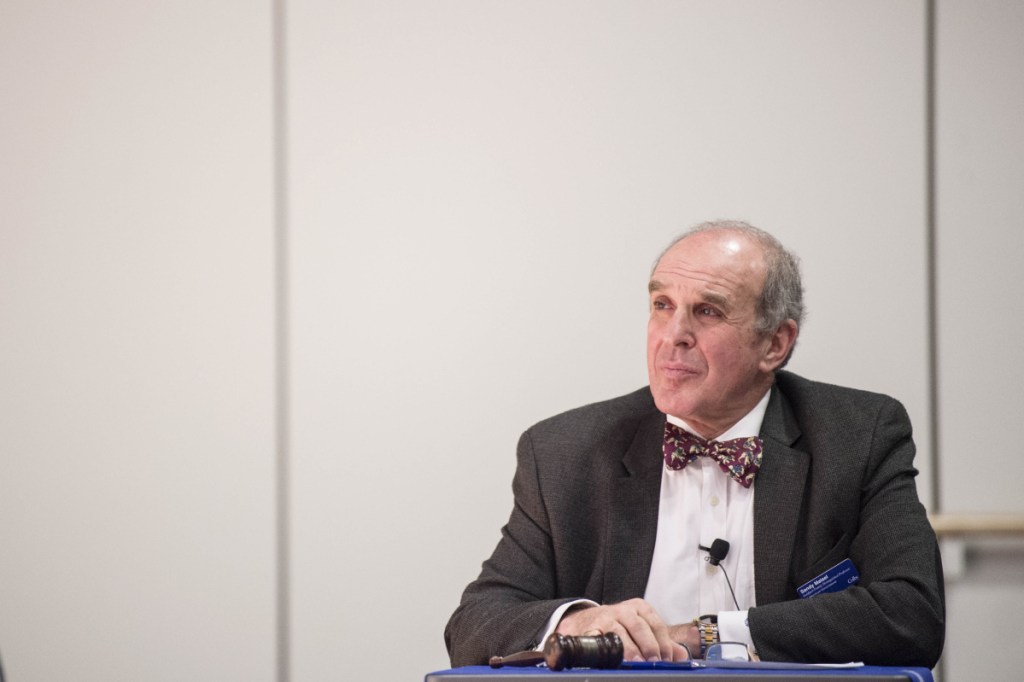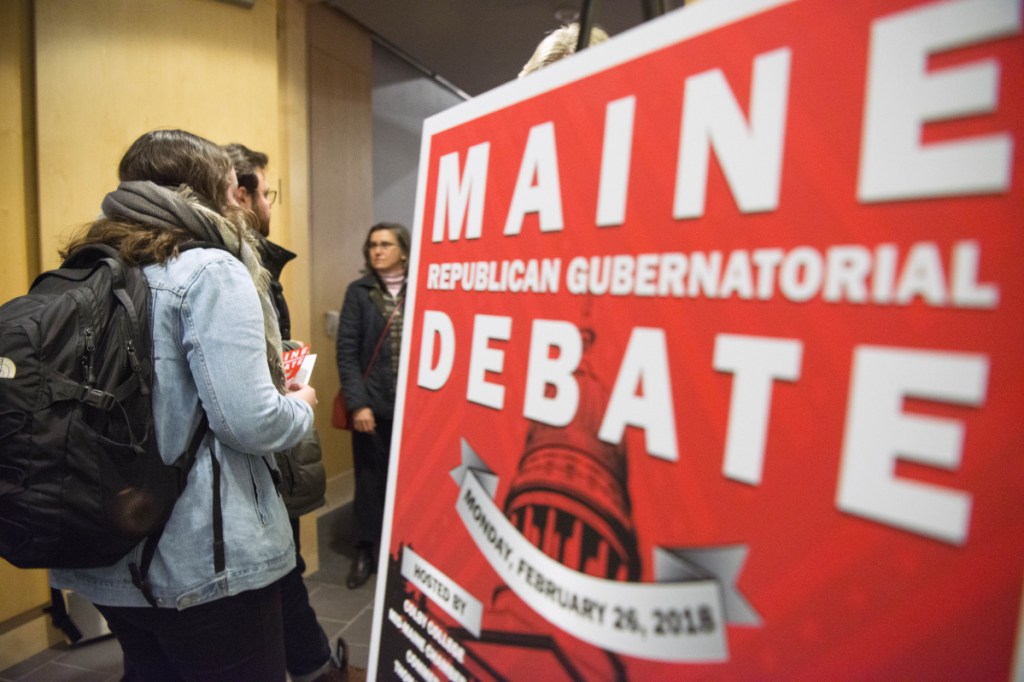WATERVILLE — The five Republican candidates for governor attempted to set each other apart from one another Monday night at Colby College during the first debate ahead of the fall election.
In the Ostrove Auditorium, the candidates — state Rep. Kenneth Fredette, former commissioner of the Department of Health and Human Services Mary Mayhew, businessman Shawn Moody, state Sen. Michael Thibodeau and state Sen. Garrett Mason — laid out their cases for why they want to take over the Blaine House this fall. Speaking before a completely packed auditorium, the candidates were asked a series of questions in an overall friendly atmosphere.
When asked about how to bring together a sense of the “two Maine’s,” meaning the economic divide between northern and southern Maine, the candidates were largely in agreement that there is a separation. Fredette said it’s a reality that there are more economic opportunities in the First Congressional District, and to solve that the state needs to bring “economic equity” to the second district. To do that, he said “we need to find where our competitive advantage is” now that former jobs, like those in the closed mills, are gone. He said as governor, he would look to put together a team equipped to address economic development in the state.
Moody, citing his experience as a business owner, said employers often have trouble finding qualified workers. He said the state needs to create incentives for young people to come back to and stay in Maine, and cited student loan forgiveness and tuition reimbursement as two possibilities.
“We’ve got to catalyze business,” Moody said.
Mason said in order to bring more economic opportunity to northern Maine could be achieved through greater access to broadband internet. He added the future of the internet isn’t on telephone poles, but is in the sky. He said as governor, he would strive to work toward that technology.
Mayhew said for the state to succeed, government needs to “get out of the pocket” of hard working Mainers. She said getting government out of the way is the best way to ensure businesses succeed.
Thibodeau said there is already good work happening in the state involving rural industries, such as with salmon fisheries and the timber industry.
When asked about gun control, all candidates leaned toward remaining pro-gun ownership. Thibodeau said he was in favor of concealed carry, even in schools if the teacher wanted. He brought up the Feb. 14 shooting in a Florida school, saying that had a coach been armed, it may have saved lives.
Mayhew said she believes others should be afforded the same safety that legislators are given in the State House, where there is an armed officer in case of a dangerous opportunity. Mason agreed with that, but also added there is a mental health aspect toward gun ownership that needs to be looked at.
Moody said he was pro-gun ownership after Fredette called him out for not answering the question, as he did not elaborate to the Portland Press Herald for a survey Fredette also said Maine has a rich hunting history, and said guns should not be taken away from constituents.
The candidates have been making their way around the state to pitch their cases, and four-fifths of the Republican hopefuls appeared at the Lincoln Dinner in Skowhegan earlier this month. Mason missed that event on Feb. 10. While at that dinner, hosted at the T&B Celebration Center, the candidates did little to distinguish themselves from each other, as each painted themselves as being anti-abortion and pro-gun ownership Republicans. Their comments on gun ownership came before the Feb. 14 shootings in Parkland, Florida, in which a gunman killed 17 people at a high school. However, in a recent poll of many of the Blaine House hopefuls conducted by the Maine Sunday Telegram, the Republican candidates largely said they would not support strong restrictions on gun ownership.
When asked how best to attract younger workers to live in Maine, Moody said far too often younger people are told by parents, teachers and guidance counselors that they have to leave Maine to find good jobs and opportunities. He said many of those younger people “listened and they left.” However, he said Maine is positioned for upward opportunity, and that since Maine has an aging population, there is opportunity for younger people to come in and thrive.
“We know how to grow,” he said.
Mason said he left Maine for opportunity elsewhere, but was able to return, and felt fortunate about that. In the legislature, he said he was proud they were able to put a freeze on tuition costs for the University of Maine system, which allowed for more out of state students to come in. This meant no more empty classrooms or dorm rooms that needed to be heated. Raising the tuition back up would negatively affect the colleges and the state’s ability to retain a younger workforce, he said.
“We need to keep tuition low,” he said.
Mayhew said to retain a younger workforce, the state must allow for businesses to be able to provide good paying jobs. To do that, she again said government needs to stay out of the way and let businesses grow on their own. She said government growing would destroy business opportunities, and to have vibrant communities and a robust economy, government needs to stay out of the way.
“We’ve got to continue to move Maine forward,” she said.
Thibodeau also said it’s about having opportunities and access to good jobs, and said the best course of action is to keep on the path the legislature has been on. He said the worst thing that could happen was for the Republican party to lose the Blaine House in the fall.
“I believe the Democrats will undo every progress that we’ve made,” he said.
Fredette said for communities north of Portland, the story is often people realizing they don’t make enough to be able to afford to live in the state. He said proper leadership would help, and contrary to Mayhew’s stance, he believed there was a place for government. He said young people need access to housing, and in terms of finances, many want to be able to buy a home but are burdened by student loans. He said he believed young people should have the ability to refinance those loans.
When asked what they viewed as the biggest issue facing Maine in this election cycle, the candidates were more varied. Mason said he believed the biggest issue was what the next steps would be. He elaborated that as meaning would the state continue on what he viewed as the right track, such as with Republican tax cuts, or would a Democratic Blaine House go a different path.
Moody said he believed the biggest issue was the referendum process, which he said is broken and was funded by out-of-state organizations that essentially was “constructing a fourth branch of government.”
Fredette said the most pressing issue is always the budget, but also said a major issue was the drug epidemic. In 2017 there were 418 people in Maine who died from drug overdoses. Across the country, he said there were 60,000 people who died as a result of addiction, a number that in a single year dwarfed the number of American causalities in the Vietnam War.
Thibodeau simply said the biggest issue was the “Maine Peoples’ Alliance writing tax policy.”
Mayhew said the biggest issue was the workforce, and the state needed to “provide a pathway out of poverty.” To do that, she said the state needed to promote work so people have self esteem. Earlier she a person given an opportunity to earn a paycheck will value that more than receiving welfare.
When asked how they viewed themselves when compared to incumbent Gov. Paul LePage, the candidates largely praised LePage’s track record in office. Moody said LePage “worked tirelessly to get our fiscal house in order,” praising LePage for bringing a different attitude to Augusta. Like Moody in this election, LePage frequently cited his business experience when he first ran for office. Moody said he would carry on LePage’s tradition.
Mason called LePage the “right man for the right time for our state,” saying Maine was on the “precipice of disaster” before LePage took over. Mason said his voting record was very similar to LePage’s, and said it was time to “press the gas pedal” and make sure tax cuts are benefiting Mainers.
Mayhew said she was proud of the work she and LePage did for helping the elderly and disabled, and said she intends to make sure those priorities remained firmly in place.
“I have had great success working with legislature to pass reforms and get our budget under control,” she said.
While praising LePage for his work, Thibodeau and Fredette tried slightly harder to distance themselves from the often brash LePage. Thibodeau said while he had no doubt Maine had benefited from LePage, he saw himself as more of a consensus builder than LePage. He said he would not “go into a room and insult everyone.”
Fredette said he was never LePage’s strongest ally, and also took a shot at Mayhew, saying while she spoke about her accomplishments with DHHS, it was the legislature that spent money, not figureheads.
“I won’t be as brash as the governor,” Fredette said. “That doesn’t mean I’m not conservative. I remain focused on the budget and reducing taxes.”
Following the debate, the Maine Democratic Party issued a response. Party Chairman Phil Bartlett said the candidates did nothing to distinguish themselves from Gov. Paul LePage. He said the last thing Mainers need is more of the same politics an economic policies.
“In fact, what we saw tonight is a fractured field of candidates who are more intent on feuding with one another to prove their conservative credentials than they are on delivering the type of change that we desperately need to make Augusta work again for Maine people,” Bartlett said in the response.
Colin Ellis — 861-9253
cellis@centralmaine.com
Twitter: @colinoellis
Send questions/comments to the editors.


